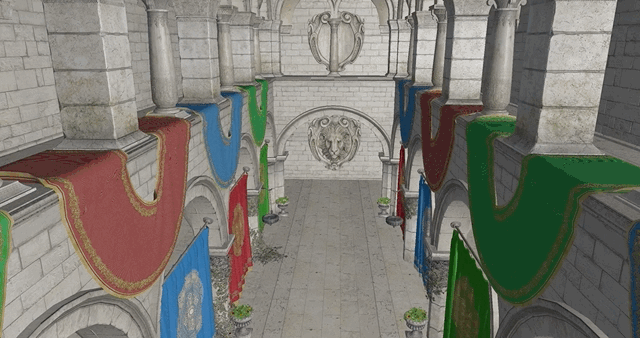资源:GLTF格式

相比于 FBX 只应用在动画系统,Arche 对于 GLTF 的加载要更加全面。
note
目前 GLTF 加载的动画资源只能用于 GPUSkinnedMeshRenderer,因为 GLTF 的动画变换被解析为有关 Entity 之间的变换。
GLTF 的加载需要使用 GLTFLoader 加载器,该加载器使用开源的 tinygltf。
在加载数据时,需要指定一个根实体,通过加载器创建的实体,都会按照子父关系挂载到该实体下:
class GLTFLoader {
public:
std::vector<std::unique_ptr<Image>> images;
std::vector<SampledTexture2DPtr> textures;
std::vector<MaterialPtr> materials;
std::vector<std::vector<std::pair<MeshPtr, MaterialPtr>>> renderers;
std::vector<GPUSkinnedMeshRenderer::SkinPtr> skins;
GLTFLoader(wgpu::Device& device);
void loadFromFile(std::string filename, EntityPtr defaultSceneRoot, float scale = 1.0f);
};
因此在使用时,可以通过如下方式加载 GLTF 资源:
auto modelEntity = rootEntity->createChild();
auto loader = loader::GLTFLoader(_device);
loader.loadFromFile("Models/sponza/sponza.gltf", modelEntity);
在 tinygltf 中,tinygltf::Model 代表改 GLTF 文件所使用的所有资源,而一个 GLTF 文件可以包含多个场景,
因此可以通过 tinygltf::Scene 选择具体要加载的场景,场景和 Entity 的节点树有关。
因此,在加载时,首先从 tinygltf::Model 当中读取所有的资源,这些资源都是可复用的数据,可以用于其他场景:
void GLTFLoader::loadScene(tinygltf::Model& gltfModel) {
...
// Load images
loadImages(gltfModel);
// Load textures && samplers
loadTextures(gltfModel);
// Load materials
loadMaterials(gltfModel);
// Load meshes
loadMeshes(gltfModel);
...
}
然后再根据 tinygltf::Scene 构建具体场景:
void GLTFLoader::loadScene(tinygltf::Model& gltfModel) {
...
// Load nodes && scenes
const tinygltf::Scene &scene = gltfModel.scenes[gltfModel.defaultScene > -1 ? gltfModel.defaultScene : 0];
for (size_t i = 0; i < scene.nodes.size(); i++) {
const tinygltf::Node node = gltfModel.nodes[scene.nodes[i]];
loadNode(nullptr, node, scene.nodes[i], gltfModel);
}
// Load animations
if (gltfModel.animations.size() > 0) {
loadAnimations(gltfModel);
}
loadSkins(gltfModel);
for (auto node : _linearNodes) {
// Assign skins
if (node.second.second > -1) {
node.second.first->getComponent<GPUSkinnedMeshRenderer>()->setSkin(skins[node.second.second]);
}
// Initial pose
auto mesh = node.second.first->getComponent<GPUSkinnedMeshRenderer>();
if (mesh) {
mesh->update(0);
}
}
}